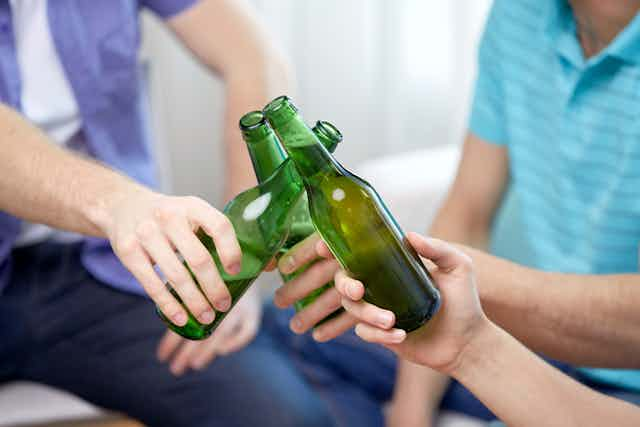Lauren, a 15 year old school student, goes to a party at a friend’s house where the parents have supplied alcohol. She drinks too much and vomits in the car on the way home.
While this type of story may be common, it’s not inevitable. Our new research suggests parents have more of a positive influence on their teenagers’ relationship with alcohol than they realise.
What parents say, how they behave and the messages they send to their teenagers can help delay when their teenage kids start drinking, which is critical if they are to avoid the harmful and life-long effects of alcohol on the developing brain.
Parental influences also set the path to better drinking patterns (and reduced rates of alcohol dependence) as their teenage kids grow up.
Why are we so concerned about teenage drinking?
Teenagers’ brains are still developing key pathways for memory, learning, judgement and impulse control. So, damage from alcohol misuse at this critical time in development can lead to cognitive issues like memory problems and learning difficulties.
This is one reason Australian guidelines recommend people under 18 avoid drinking alcohol altogether and delay starting for as long as possible.
How big a problem is it?
Out-of-control teenage parties often make the news headlines, so it’s easy to think teenage drinking is a growing problem.
But two national surveys have confirmed drinking rates among school students (aged 12-17) and young adults (aged 18-24) are declining.
So, while young people may think drinking is the norm, this is not the case, especially for those under the age of 15 where fewer than 15% report having drunk alcohol in the past month and 8% in the past week.
Nevertheless, alcohol contributes to four of the top five leading causes of death in 15-24 year olds, including suicide, traffic accidents, accidental poisoning and assault. Alcohol in this age group can also lead to sexual risk-taking and is often associated with trying smoking or taking illicit drugs.
It’s easy to think our efforts as parents to foster healthier drinking habits in our teenage children is futile. But evidence shows exactly how parents can make a difference. Here are three things you can do to help your teenage kids develop a healthier relationship with alcohol.
1. Limit availability of alcohol
Many parents believe supplying their children with alcohol in the safe environment of their home teaches them to drink responsibly.
In fact, an Australian survey found parents were the most common source of alcohol with 38% of 12-17 year olds who had drunk in the past week indicating their parents gave them their last drink.
Unfortunately, parental supply – whether deliberate or if teenagers drink their parent’s supply behind their back – is associated with heavier teen drinking. And a study from the Netherlands found the more adolescents drank at home, the more they were likely to drink outside of the home, which predicted future problem drinking.
Our study also found if adolescents thought they could buy alcohol easily, they were more likely to drink regularly. And the more spending money 16-17 year olds had, the more likely they were to drink.
The weight of the evidence is now clear. Allowing children to drink underage and supplying them with alcohol, including at parties, even under the supervision of a parent, is not recommended.
2. Set boundaries and clear expectations
Parents have a vital role to play in setting boundaries and clear expectations about drinking alcohol. Discuss alcohol with your kids and the fact not everyone drinks, even though it might seem like they do.
Talk about upcoming activities, including parties, and discuss expectations about acceptable and unacceptable behaviour. Talk to other parents and let them know your expectations as it’s important to set clear social norms and expectations.
Our study found adolescents who thought their parents would disapprove of them drinking alcohol were much less likely to drink. This was the case across the whole age spectrum of 12-17 years.
3. Be a good role model
Alcohol is the most widely used recreational drug in Australia and most adult drinking (80%) is done in the home. So, we also need to think about our own drinking in front of our children, however uncomfortable the prospect.
Parents are important role models for kids when it comes to alcohol. Setting a good example by limiting drinking in front of kids where possible, not making alcohol and drinking a key focal point, having alcohol-free events and cutting back on your own binge drinking are all significant.
This is important because kids who live in families where parents drink on a regular basis around their children are more likely to drink more heavily themselves and start at an earlier age.
Parents are not the only influence, but are still important
While parents can play a vital role in their children’s relationship with alcohol, they are not the only factor to influence teenage drinking.
Alcohol is more affordable in Australia than it has been in the past 30 years, and the number of premises selling alcohol has increased substantially in the past 15 years. Throw advertising and sports sponsorship into the mix and we have some very strong messages that drinking alcohol is the norm.
Yet, the evidence shows parents can make significant and substantial difference in their teenage children’s relationship with alcohol, particularly in not giving them alcohol before they turn 18 and helping them set good behavioural patterns around alcohol now and for later life.

